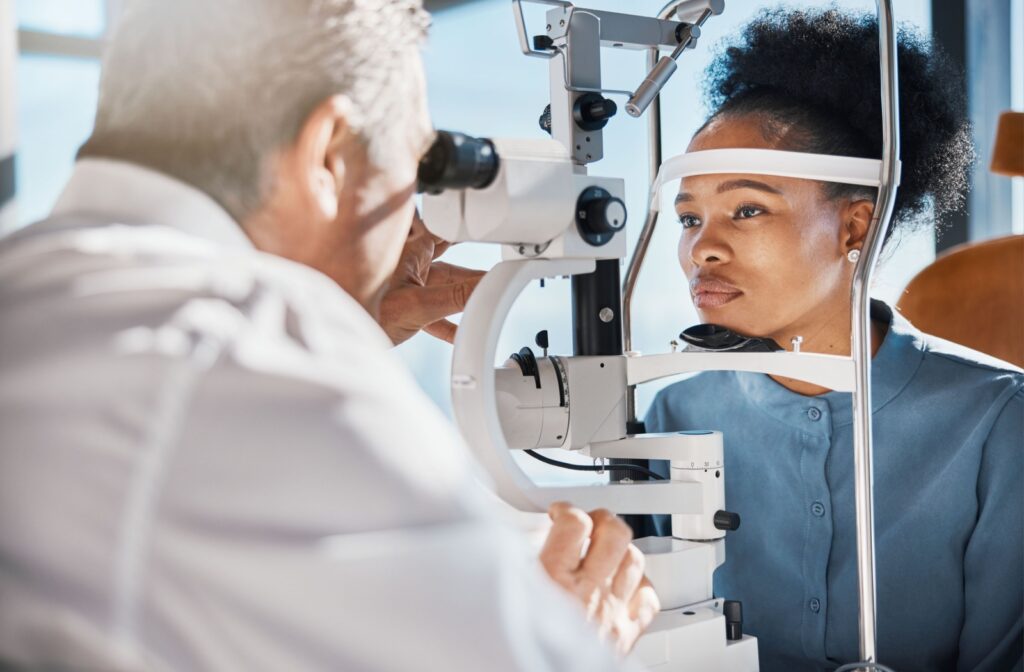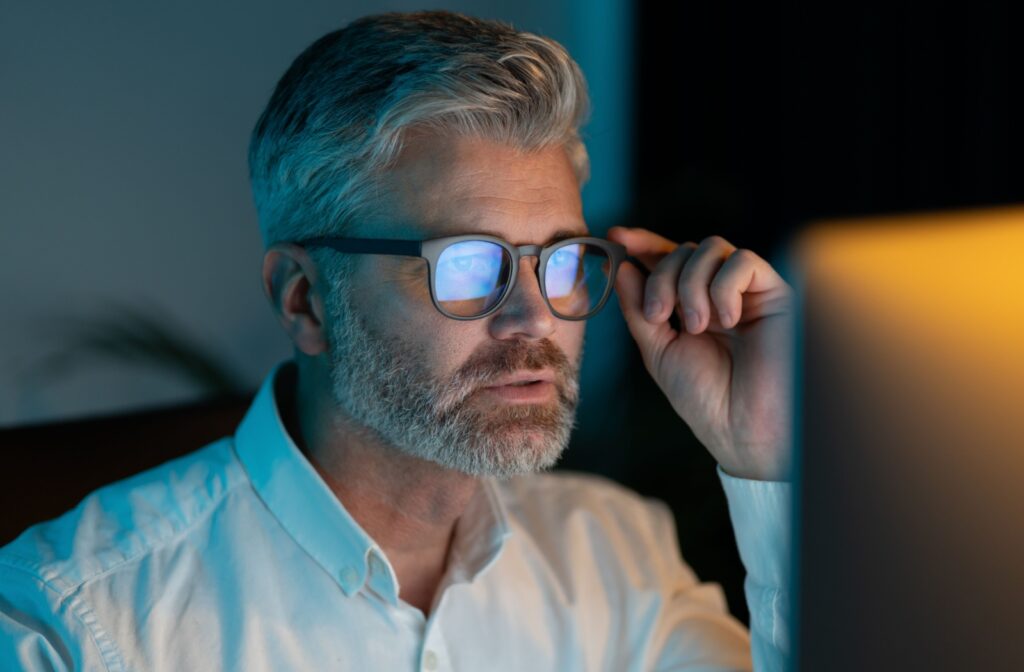Today, screens are a near-permanent fixture in our lives. All that screen time comes with blue light exposure and digital eye strain. Some people are turning to blue light glasses as a solution. But what do these glasses do?
Blue light glasses are supposed to block blue light from reaching your eyes using a yellow or amber filter. This is supposed to help reduce digital eye strain and improve your sleep.
What Does Blue Light Do to Our Eyes?
Blue light is a type of high-energy visible (HEV) light. While it naturally comes from sources like sunlight, it’s also emitted by digital screens such as smartphones, computers, tablets, and even LED lighting.
The issue with blue light arises when we’re exposed to it for prolonged periods, something many of us experience daily due to working at a desk or spending hours online. This can lead to two key challenges:
- Digital eye strain: Spending hours in front of screens can cause symptoms like dryness, headaches, blurred vision, and tired eyes.
- Sleep disruption: Blue light suppresses melatonin, the hormone that helps regulate your sleep-wake cycle. This makes it harder to fall asleep, especially if you’re scrolling through your phone right before bed.
While research on the long-term effects of blue light is ongoing, we do know that reducing exposure during critical times may support healthier sleep and limit discomfort.
How Do Blue Light Glasses Work?
Blue light glasses use lenses designed to filter or block blue light wavelengths from reaching your eyes. These lenses often have a subtle yellow or amber tint, which neutralizes the blue colors that screens emit. These claims have made blue light glasses incredibly popular, especially among those who spend significant time in front of screens. But how effective are they?
Do Blue Light Glasses Actually Work?
The effectiveness of blue light glasses depends on what you’re using them for. Current research is limited, and here’s what studies suggest:
1. For Eye Strain
There’s little evidence that blue light glasses can significantly reduce digital eye strain. Eye strain is more commonly caused by staring at a screen for too long without taking breaks, rather than by blue light itself. Other habits will likely have a greater impact on reducing eye strain symptoms.
2. For Sleep Improvement
Unlike eye strain, studies do suggest that blue light glasses may help with sleep disruptions. By filtering out blue light during evening hours, these glasses may prevent interference with melatonin production and help you fall asleep faster.
The Role of Healthy Habits for Eye Health
While blue light glasses can help in specific ways, they shouldn’t be seen as the ultimate solution. Pairing them with simple lifestyle adjustments can make a significant difference in managing screen-related challenges. Here are a few tips:

Limit Screen Time Before Bed
One of the best things you can do for your sleep is to reduce screen use 1-2 hours before bedtime. This gives your body time to wind down and start its melatonin production.
Enable Screen Filters
Most phones, tablets, and laptops now have built-in blue light filters, often called “Night Mode” or “Dark Mode.” These settings reduce the intensity of blue light emitted, helping to ease the strain on your eyes.
Practice the 20-20-20 Rule
Every 20 minutes, take a 20-second break from your screen and look at something 20 feet away. This simple habit helps relax your eye muscles and significantly reduces the discomfort of prolonged screen time.
Maintain an Ergonomic Workspace
Ensure that your workspace is well-lit and your screen is positioned at eye level to minimize strain. Adding an anti-glare screen protector can also be helpful for reducing glare.
Prioritize Overall Eye Health
Good hydration, regular sleep, and a balanced diet that includes eye-friendly nutrients like omega-3 fatty acids and lutein are essential for maintaining your vision health. It’s also important to make sure you are attending regular eye exams to keep up with your eye health.
Should You Invest in Blue Light Glasses?
Deciding whether blue light glasses are right for you often depends on your habits and priorities. If you:
- Spend long hours working on screens and experience frequent discomfort, adopting better screen habits may have a greater impact than glasses alone.
- Have trouble falling asleep after using screens at night, wearing blue light glasses in the evening could be a helpful step.
It’s also a good idea to consult an optometrist about your specific needs.
Better Eye Care Today
At Vision Veritas Eyecare, we’re passionate about educating and empowering our patients to make the best choices for their unique eye health needs. Whether blue light glasses are part of your solution or you’re looking for other ways to reduce digital eye strain, we’re here to guide you. Book an appointment with us to learn more about protecting your vision and enhancing your eye health.





